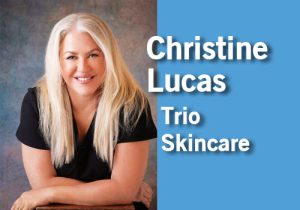With rosacea, patients are blushing for all the wrong reasons
 CONCORD, CA (Dec. 23, 2024) — More than 13 million Americans suffer from a chronic skin disease called rosacea. While not curable, it can be manageable with proper intervention and education.
CONCORD, CA (Dec. 23, 2024) — More than 13 million Americans suffer from a chronic skin disease called rosacea. While not curable, it can be manageable with proper intervention and education.
Those who struggle with rosacea face unpredictable cycles of flare-ups and periods of remission. Though symptoms may temporarily subside, the condition doesn’t go away. Like any poorly understood disease, we are continuously researching innovative solutions for this progressive condition that affects so many of our clients.
Rosacea is more common in women, but it is more severe in men. It can manifest at any age, typically between 25 and 70. In our experience, pre-rosacea has been diagnosed as young as 11 years old. Evidence supports that it is a hereditary or genetically linked disease that is more prominent in people with fair skin such as Northern European, Celtic and Scandinavian ancestry.
Rosacea is a chronic skin disorder marked by vascular instability, persistent inflammation and heightened skin sensitivity. The condition typically develops gradually, progressing through stages and the severity can vary.
Symptoms
Diagnosing rosacea can be tricky, as its symptoms – such as redness, broken capillaries and pustules – are like other skin conditions like acne vulgaris, seborrheic dermatitis and contact dermatitis. This makes a thorough skin evaluation and detailed client history essential for correct diagnosis. Broken capillaries do not automatically mean rosacea.
Any activity or lifestyle characteristic that puts stress on the venous system is a potential “trigger.” Persistent exposure to triggers will stimulate flareups, so the key word is moderation. Triggers vary for each rosacea sufferer and what affects one client may not influence another.
Start by finding what makes you “flush and blush.” This typically includes alcohol, foods causing a histamine release in the body, scrubs and abrasive cleansing cloths, and tools that create friction and heat in the skin. Avoid synthetic preservatives, fragrances and dyes in all personal care products. Avoid prolonged heat, sun exposure and use chemical-free physical sunblock daily. Mineral powders also provide anti-inflammatory support to the skin.
Treatment
While there is no cure for rosacea, it can be managed effectively with a comprehensive approach that includes trigger management, professional treatments and the appropriate at-home products to control and even reverse its symptoms. Left untreated or improperly managed, rosacea will worsen over time.
Managing rosacea doesn’t have to be a frustrating journey. With the right guidance and customized skincare solutions, you can take control of your skin and feel confident again.
At Trio Skincare, we specialize in result-driven products and services designed for sensitive and compromised skin conditions such as rosacea. Let’s work together to create a plan tailored just for you. Schedule your consultation today and take the first step toward healthier skin.
For more information about Trio Skincare’s anti-aging/acne management clinic in Concord, visit www.trioskincare.com or call 925-609-8746.
